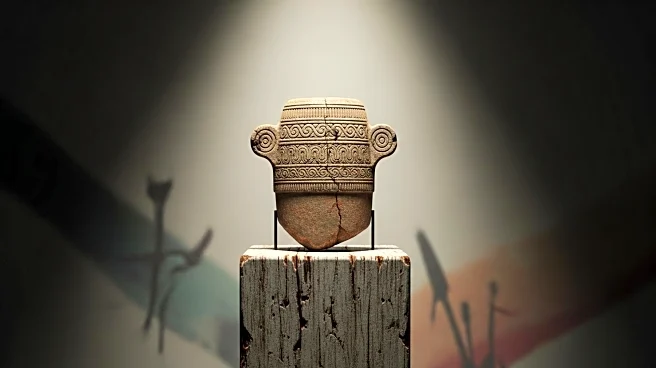What's Happening?
PEN America has released a report detailing significant destruction of cultural sites in Gaza due to Israeli military actions. The report, titled 'All That Is Lost,' highlights the demolition of museums, heritage centers, and archaeological sites, alongside the deaths of over 150 cultural figures. The report underscores the existential threat to Palestinian culture, noting the impact on 36 cultural, historical, religious, and educational institutions. It also mentions the alleged violations of the Hague Convention, suggesting that the destruction constitutes war crimes and crimes against humanity. The report calls for an investigation into these actions and emphasizes the cultural loss as an assault on Palestinian identity.
Why It's Important?
The destruction of cultural heritage in Gaza has profound implications for the Palestinian community, affecting their historical identity and cultural continuity. The report highlights the broader humanitarian crisis, with significant loss of life and infrastructure. The cultural devastation not only impacts the local community but also raises international concerns about the preservation of cultural heritage in conflict zones. The report's findings may influence global policy discussions on cultural preservation and human rights, potentially leading to increased international scrutiny and calls for accountability.
What's Next?
PEN America urges a halt to attacks on Palestinian cultural heritage and calls for investigations into potential war crimes. The report may prompt international organizations and governments to take action, possibly leading to diplomatic interventions or sanctions. The ongoing conflict and its impact on cultural sites could continue to be a focal point in international relations, influencing future peace negotiations and humanitarian efforts.
Beyond the Headlines
The report highlights the ethical and legal dimensions of cultural destruction in conflict zones, raising questions about the protection of cultural heritage under international law. It also underscores the cultural resilience of the Palestinian people, as artists and cultural figures continue to create and preserve their heritage despite adversity. The long-term implications include potential shifts in cultural preservation strategies and increased advocacy for cultural rights in conflict areas.












